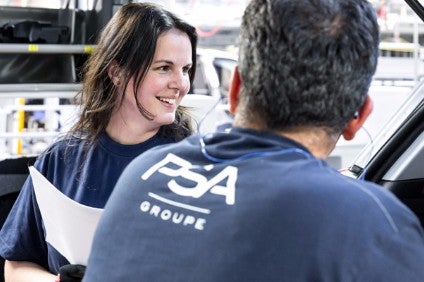
Groupe PSA is in a position to avoid EU penalties that would arise from exceeding tougher company fleet average CO2 targets in 2020, according to Citroen CEO Linda Jackson.
OEM groups in Europe face a considerable challenge to meet the tougher EU fleet average CO2 targets in 2020 and face hefty fines if they fail to do so.

Discover B2B Marketing That Performs
Combine business intelligence and editorial excellence to reach engaged professionals across 36 leading media platforms.
Speaking to journalists today, Jackson reiterated that the PSA group is on track to meet its CO2 objectives on the basis of its strategic product planning. “As a business, we do not want to pay fines,” she said. “And we will meet our objectives for CO2. We have many things in place to ensure that, not just simply selling more electric vehicles. It is also the mix of the other vehicles. It is also improving the technology of our existing petrol and diesel offerings to make sure they are even more CO2 friendly.
“It is also about some of the things we have done to reduce the weight of our vehicles, because that makes an impact as well. It’s a complete strategy that we have introduced, controlling it down to dealer level in order to make sure we meet our CO2 objectives.”
Groupe PSA has is planning to offer a 100% electrified range from 2025, of which 50% will be electrified by the end of 2021 with 13 additional electrified models.
Since 2019, all new models launched by Groupe PSA come with either an all-electric or a plug-in hybrid powertrain.
One difficulty for manufacturers is that the EU rules point to a need to sell a higher proportion of smaller vehicles with low CO2 – but smaller vehicles usually come with thinner margins. The European car market has also been gravitating towards relatively heavy SUVs in recent years. The auto industry in Europe has argued that the tougher EU rules, which hit OEMs with higher European region sales disproportionately hard, will impair its competitive position globally.
The new EU CO2 rules
From 2021, but phased in from 2020, the EU fleet-wide average emission target for new cars will be 95g CO2/km (the current level is estimated to be in the region of 120g/km, making the target a serious challenge for the industry). In 2020, the emission targets will apply for each manufacturer’s 95% least emitting new cars. From 2021 on, the average emissions of all newly registered cars of a manufacturer will have to be below the target.
If the average CO2 emissions of a manufacturer’s fleet (vehicles sold in EU) exceed its target in a given year, the manufacturer has to pay an excess emissions premium for each car registered. The company penalty will be EUR95 for each g/km of target exceedance, fines that could quickly mount up into billions of euros based on where manufacturers were last year and assuming the profile of sales in Europe is unchanged. There are different thresholds according to manufacturer volumes sold, but JATO estimates that from 2021, manufacturers selling cars in Europe would have to pay an excess emissions penalty premium totalling EUR33.6bn based on 2018 CO2 averages (ie if nothing changes).
JATO’s study last year suggested that VW Group would potentially be the most exposed overall (average 121.2gm CO2/km) under the new tighter EU rules, facing a fine of EUR2,525 for each vehicle sold (based on its 2018 sales), amounting to a whopping EUR12.5bn. The report suggested that Toyota is the best performer on CO2 among the volume makers with an average CO2 figure (again, based on 2018 sales) of just 101.3gm CO2/km. PSA was estimated at 114.2gm CO2/km, while premium makers BMW and Daimler were each close to 130g CO2/km.
The EU CO2 targets further out are stricter still, but the industry ought to be well on the way towards a much higher market penetration for EVs by then. New car CO2 emissions, on average, have to reduce by 15% by 2025 and by 37.5% by 2030, relative to a 2021 baseline. Using the current 2021 CO2 target of 95g/km as the baseline, these reductions would translate into a target value of 81g/km (2025) and 59g/km (2030).
See also: Management rejig at Citroen and DS






